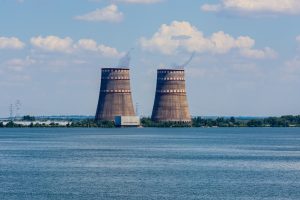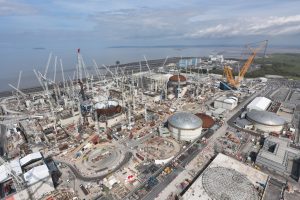Arcadis is in the process of winding down its Middle East operations due to issues with getting paid by clients, but is positive about the wider economic outlook and is confident about its own success and ethics, according to the company’s chief executive.
Arcadis CEO and chair Alan Brookes spoke with NCE about how the business is doing and shared his thoughts on what the new Labour government means for the civil engineering sector.
Middle East and Neom
Despite all the hype about Neom and other major infrastructure projects in the Middle East, Brookes said Arcadis is in the process of leaving the region.
Neom is one of the biggest areas of civil engineering work on the planet, but controversy around the project means civil engineering firms rarely discuss their work.
Civil engineering firms were silent in May 2024 when BBC reported that Saudi Arabia authorised use of lethal force against civilians standing in the way of its linear city The Line.
A former Saudi Arabian intelligence officer Col Rabih Alenezi told the BBC he was ordered to kill any indigenous people who refused to leave their homes to make way for the construction of the Line, which is the flagship project of the Neom gigaproject. The order was made on a village called al-Khuraybah, 4.5km south of The Line, which was mostly occupied by the Huwaitat tribe.
Arcadis had previously been linked with Neom as a project manager on its Red Sea project, according to MEED.
Asked by NCE if Arcadis is involved with Neom, Brookes said: “No, we’re not. We made a decision three or four years ago that we will finish all projects and be out of the Middle East in total by the end of this year.
“The main reason to make that decision was cash. You just don’t get paid, basically, is the honest answer.
“We’ve just been paid money from [work done in] 2018. And you think, [you’re] on a 30-day payment terms and you’re getting paid from 2018. Seriously?”
Brookes went on to say that another issue was that Middle Eastern clients sometimes did not ensure health and safety standards on projects.
“One of the conditions was that [clients] abided by our health and safety rules, and we found that too many clients would say ‘Yes’ but not follow through on that all the time,” he said.
“We have a set of rules about how you would undertake a project [including] proper health and safety planning, proper checks, that the contractors are briefed properly.”
Brookes said most contractors “are fine” but clients “would sometimes say ‘Well yes you know that’s okay but let’s get on with the project. Let’s move the project forward, time is everything’”.
He emphasised the main reason for Arcadis’s withdrawal from the Middle East was the company’s concerns about getting paid for work done.
“We had about 2,000 people, we’re down to about 200 at the minute and we will be finished by the end of this year,” he said. He added that Arcadis “would not let any client down at all, so we would leave in an orderly manner”.
He added: “For the last two years or so, we’ve not taken on another project [in the Middle East].”
Reaction to the new government
The biggest thing on civil engineering leaders’ minds at the moment is the impact of the new Labour government. Reflecting on the economic outlook under the new government, Brookes said: “I’m really positive. I live in the UK, though I’m here in the Netherlands and we’re a Dutch business. The UK is a pretty large business for us; around 7,500 people.”
Brookes said the new publicly-owned energy company being established by the government, Great British Energy, “really plays to what we stand for”, referencing the company’s 2024-2026 Strategy: Accelerating a Planet Positive Future.
On devolution, Brookes welcomed the early commitments from the government to empower metro mayors to deliver targeted investments in their regions.
“One of the first meetings at 10 Downing Street was to pull the metro mayors in and I thought that was a good signal of intent,” he said. “I would hope that that would be followed through because I do think the way to level up is going to be empowering the mayors that can really make a difference in the local scene.”
Planning reform
A major area of policy from the government has been around planning reform and housing and infrastructure delivery. Chancellor Rachel Reeves set out in her first major speech after taking up the post that the government would prioritise national interest over local opposition when considering significant developments.
That approach then led to the government asking conservation bodies to work with it to address what it called the “lose-lose” situation in the planning system.
“I’m really pleased to see they’ve started to talk about townships, because that’s how to create communities; saying ‘Let’s take an area, build a town around it, put everything in there to educate the children, to put the health [services] there,” Brookes said.
He said he believes the government is right to pursue planning reform. “If we see that as confrontation, I think that’s the right sort of confrontation because nothing will change otherwise,” he added.
Recruitment and ethics
Civil engineering faces two major problems in staffing projects. One is recruiting the right number of people with the right skills, especially in areas which are accelerating activities such as the Great Grid Upgrade and new nuclear. And the other is keeping people in the business.
“In the UK, about 18 months ago, we looked at ‘How do we get the skills that we want in the future? And how do we lower our turnover and keep the turnover lower to keep the people in the business?’,” Brookes said.
“We did a few things. We surveyed all our people, which we do now every quarter, [amd asked] ‘What do you need? What do you want?’”
He said one of the findings of the survey was staff wanted Arcadis to be more explicit about its mission. Brookes said Arcadis responded by saying “When you join us, the work that you do will only accelerate a planet positive future”.
“For younger people joining that can be quite powerful,” Brookes continued. “So we will not do oil or gas exploration or things like that. But we will clean up. It’s not about the clients. It’s about the projects that we do.”
Brookes went on to say Arcadis “wanted to make a stand”.
He explained that the company still works for oil and gas companies, but only on remediation projects. “We clean up petrol stations and things like that, but it’s not a business that we want to go into for exploration,” he said.
“We’ll work on any renewable energy for those companies like Shell who are quite big on renewable energy.”
Regarding the diversity of people in the business, Brookes said Arcadis is looking to increase the proportion of women.
“We set out in our capital markets day [on 16 November 2023] that we wanted to have 40% female representation in our business,” he said. “We were at about 37% when we launched and we’re now at 39%, so we’re making headway.”
He went on to say: “We have affinity groups across our business, for religion, for Pride [...] we have the women of colour team. And so we put together all sorts of groups to advise us internally, [to find out] what do they want? What would make them feel more welcome in our business?”
Brookes also reflected on the progress Arcadis has made on its three-year 2024-2026 Strategy: Accelerating a Planet Positive Future.
Brookes said the company is “doing well” on the strategy, which started in January.
“We’re actually growing as a business. Our profits are rising. On our net zero charge, we are moving forward strongly,” he said. “And then our diversity, we’re moving forward strongly.
“We’re trying to say you can do both. It doesn’t mean that one is exclusive and the other I think actually performance of the business is good when you have that balance and that's a strong message.”
Like what you've read? To receive New Civil Engineer's daily and weekly newsletters click here.
 New Civil Engineer Civil engineering and construction news and jobs from New Civil Engineer
New Civil Engineer Civil engineering and construction news and jobs from New Civil Engineer




Clients in the Middle East all seem to believe that contracts mean nothing and you only get paid when they think you’re at the end of your tether. It’s the reason Halcrow went bust back in 2008. No matter how much the local (British) Halcrow management team tried to massage the cashflow, it was always obvious that there was always about £80 million owing. That is unsustainable and brought Halcrow down when the GFC hit. I applaud the Arcadis CEO for being so open and honest about his reasons for pulling out of the ME.